BUSN20017: Effective Business Communication Essay Analysis Report
VerifiedAdded on 2022/10/17
|10
|2530
|88
Essay
AI Summary
This essay delves into the realm of effective business communication, focusing on the practices within the Australian Agricultural Company. It examines both appropriate and inappropriate communication behaviors, emphasizing the importance of adaptability, active listening, and proactive responses. The essay analyzes the significance of professional knowledge and adaptability for newly hired employees, while highlighting behaviors such as laziness and poor communication skills as detrimental. It also discusses the methods of efficient communication, including the use of emails, meetings, and digital platforms, and emphasizes the importance of maintaining a professional and respectful environment. The essay provides recommendations for fostering a positive and productive workplace, ultimately contributing to the company's success. The essay also includes a case study focusing on the hiring of new employees from overseas and how effective communication can be used to integrate them into the workplace.
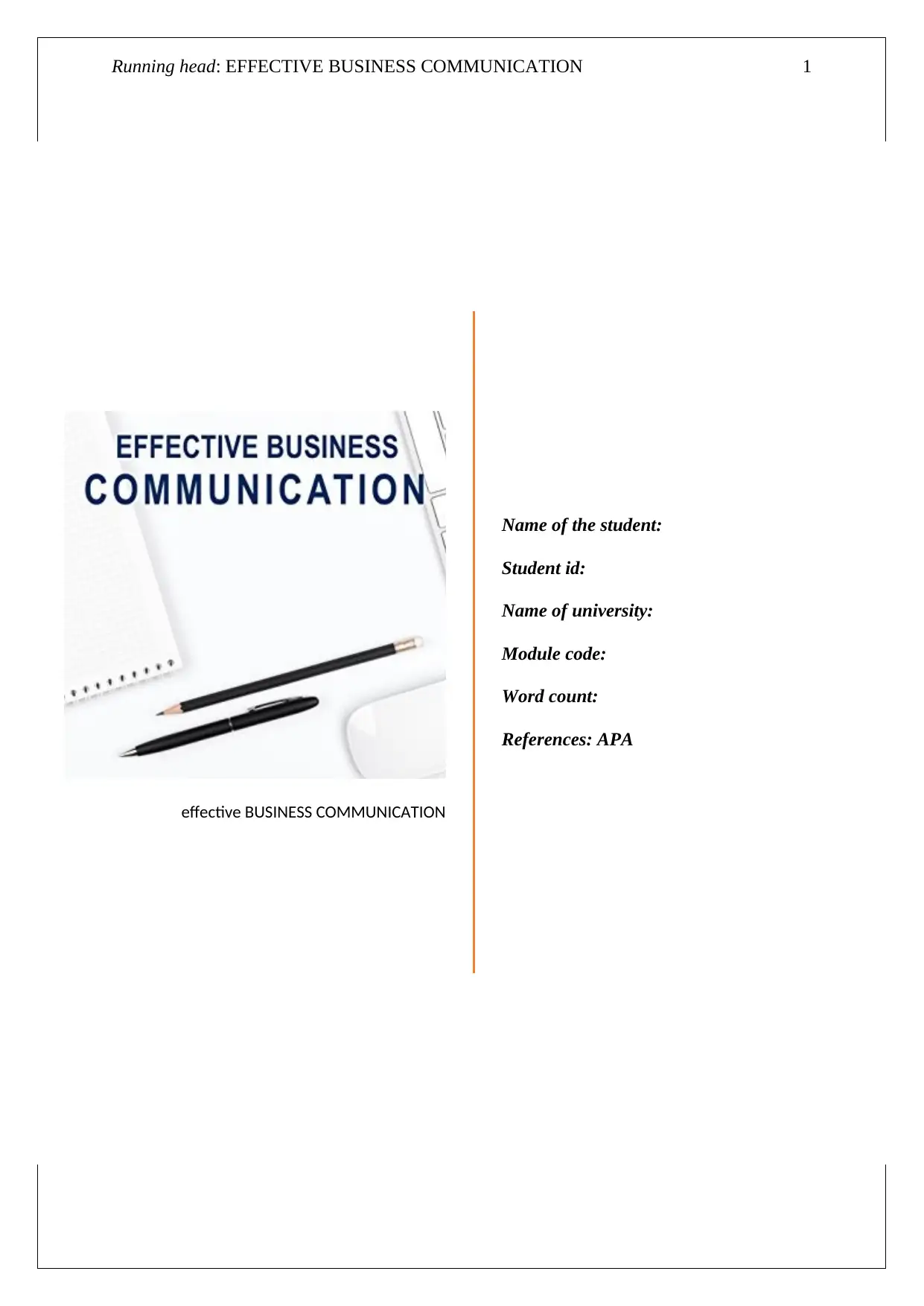
Running head: EFFECTIVE BUSINESS COMMUNICATION 1
effective BUSINESS COMMUNICATION
Name of the student:
Student id:
Name of university:
Module code:
Word count:
References: APA
effective BUSINESS COMMUNICATION
Name of the student:
Student id:
Name of university:
Module code:
Word count:
References: APA
Paraphrase This Document
Need a fresh take? Get an instant paraphrase of this document with our AI Paraphraser
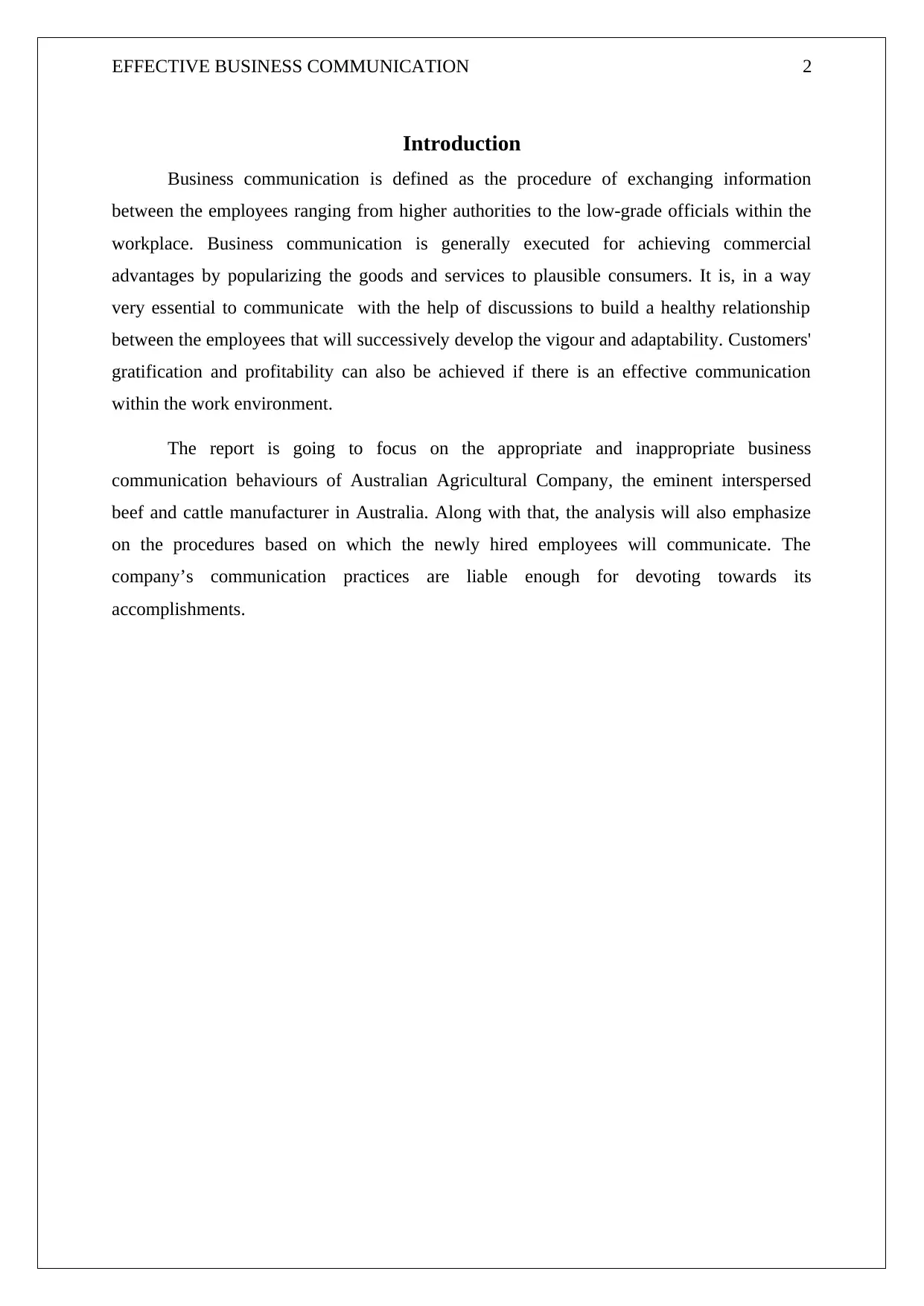
EFFECTIVE BUSINESS COMMUNICATION 2
Introduction
Business communication is defined as the procedure of exchanging information
between the employees ranging from higher authorities to the low-grade officials within the
workplace. Business communication is generally executed for achieving commercial
advantages by popularizing the goods and services to plausible consumers. It is, in a way
very essential to communicate with the help of discussions to build a healthy relationship
between the employees that will successively develop the vigour and adaptability. Customers'
gratification and profitability can also be achieved if there is an effective communication
within the work environment.
The report is going to focus on the appropriate and inappropriate business
communication behaviours of Australian Agricultural Company, the eminent interspersed
beef and cattle manufacturer in Australia. Along with that, the analysis will also emphasize
on the procedures based on which the newly hired employees will communicate. The
company’s communication practices are liable enough for devoting towards its
accomplishments.
Introduction
Business communication is defined as the procedure of exchanging information
between the employees ranging from higher authorities to the low-grade officials within the
workplace. Business communication is generally executed for achieving commercial
advantages by popularizing the goods and services to plausible consumers. It is, in a way
very essential to communicate with the help of discussions to build a healthy relationship
between the employees that will successively develop the vigour and adaptability. Customers'
gratification and profitability can also be achieved if there is an effective communication
within the work environment.
The report is going to focus on the appropriate and inappropriate business
communication behaviours of Australian Agricultural Company, the eminent interspersed
beef and cattle manufacturer in Australia. Along with that, the analysis will also emphasize
on the procedures based on which the newly hired employees will communicate. The
company’s communication practices are liable enough for devoting towards its
accomplishments.
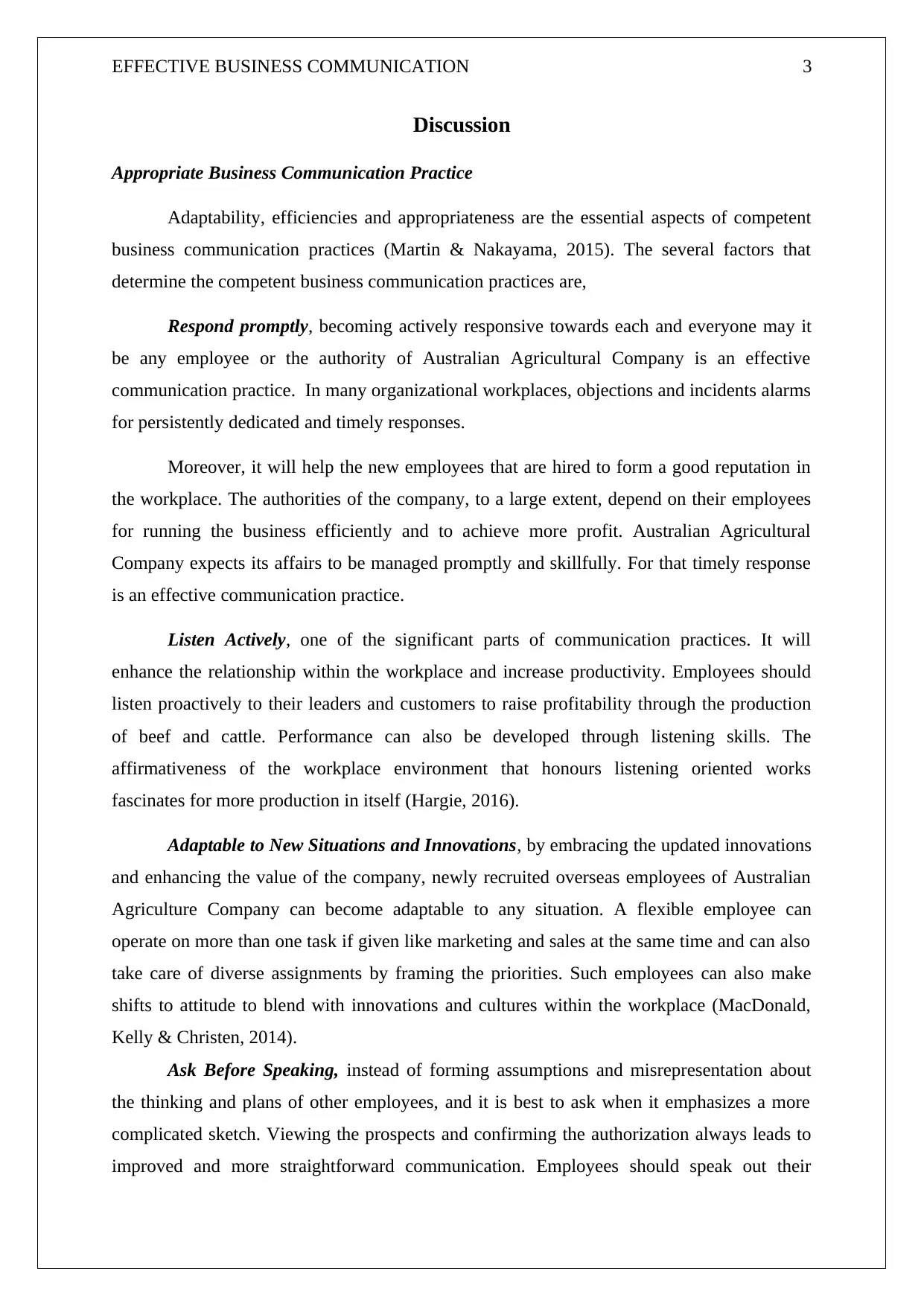
EFFECTIVE BUSINESS COMMUNICATION 3
Discussion
Appropriate Business Communication Practice
Adaptability, efficiencies and appropriateness are the essential aspects of competent
business communication practices (Martin & Nakayama, 2015). The several factors that
determine the competent business communication practices are,
Respond promptly, becoming actively responsive towards each and everyone may it
be any employee or the authority of Australian Agricultural Company is an effective
communication practice. In many organizational workplaces, objections and incidents alarms
for persistently dedicated and timely responses.
Moreover, it will help the new employees that are hired to form a good reputation in
the workplace. The authorities of the company, to a large extent, depend on their employees
for running the business efficiently and to achieve more profit. Australian Agricultural
Company expects its affairs to be managed promptly and skillfully. For that timely response
is an effective communication practice.
Listen Actively, one of the significant parts of communication practices. It will
enhance the relationship within the workplace and increase productivity. Employees should
listen proactively to their leaders and customers to raise profitability through the production
of beef and cattle. Performance can also be developed through listening skills. The
affirmativeness of the workplace environment that honours listening oriented works
fascinates for more production in itself (Hargie, 2016).
Adaptable to New Situations and Innovations, by embracing the updated innovations
and enhancing the value of the company, newly recruited overseas employees of Australian
Agriculture Company can become adaptable to any situation. A flexible employee can
operate on more than one task if given like marketing and sales at the same time and can also
take care of diverse assignments by framing the priorities. Such employees can also make
shifts to attitude to blend with innovations and cultures within the workplace (MacDonald,
Kelly & Christen, 2014).
Ask Before Speaking, instead of forming assumptions and misrepresentation about
the thinking and plans of other employees, and it is best to ask when it emphasizes a more
complicated sketch. Viewing the prospects and confirming the authorization always leads to
improved and more straightforward communication. Employees should speak out their
Discussion
Appropriate Business Communication Practice
Adaptability, efficiencies and appropriateness are the essential aspects of competent
business communication practices (Martin & Nakayama, 2015). The several factors that
determine the competent business communication practices are,
Respond promptly, becoming actively responsive towards each and everyone may it
be any employee or the authority of Australian Agricultural Company is an effective
communication practice. In many organizational workplaces, objections and incidents alarms
for persistently dedicated and timely responses.
Moreover, it will help the new employees that are hired to form a good reputation in
the workplace. The authorities of the company, to a large extent, depend on their employees
for running the business efficiently and to achieve more profit. Australian Agricultural
Company expects its affairs to be managed promptly and skillfully. For that timely response
is an effective communication practice.
Listen Actively, one of the significant parts of communication practices. It will
enhance the relationship within the workplace and increase productivity. Employees should
listen proactively to their leaders and customers to raise profitability through the production
of beef and cattle. Performance can also be developed through listening skills. The
affirmativeness of the workplace environment that honours listening oriented works
fascinates for more production in itself (Hargie, 2016).
Adaptable to New Situations and Innovations, by embracing the updated innovations
and enhancing the value of the company, newly recruited overseas employees of Australian
Agriculture Company can become adaptable to any situation. A flexible employee can
operate on more than one task if given like marketing and sales at the same time and can also
take care of diverse assignments by framing the priorities. Such employees can also make
shifts to attitude to blend with innovations and cultures within the workplace (MacDonald,
Kelly & Christen, 2014).
Ask Before Speaking, instead of forming assumptions and misrepresentation about
the thinking and plans of other employees, and it is best to ask when it emphasizes a more
complicated sketch. Viewing the prospects and confirming the authorization always leads to
improved and more straightforward communication. Employees should speak out their
⊘ This is a preview!⊘
Do you want full access?
Subscribe today to unlock all pages.

Trusted by 1+ million students worldwide
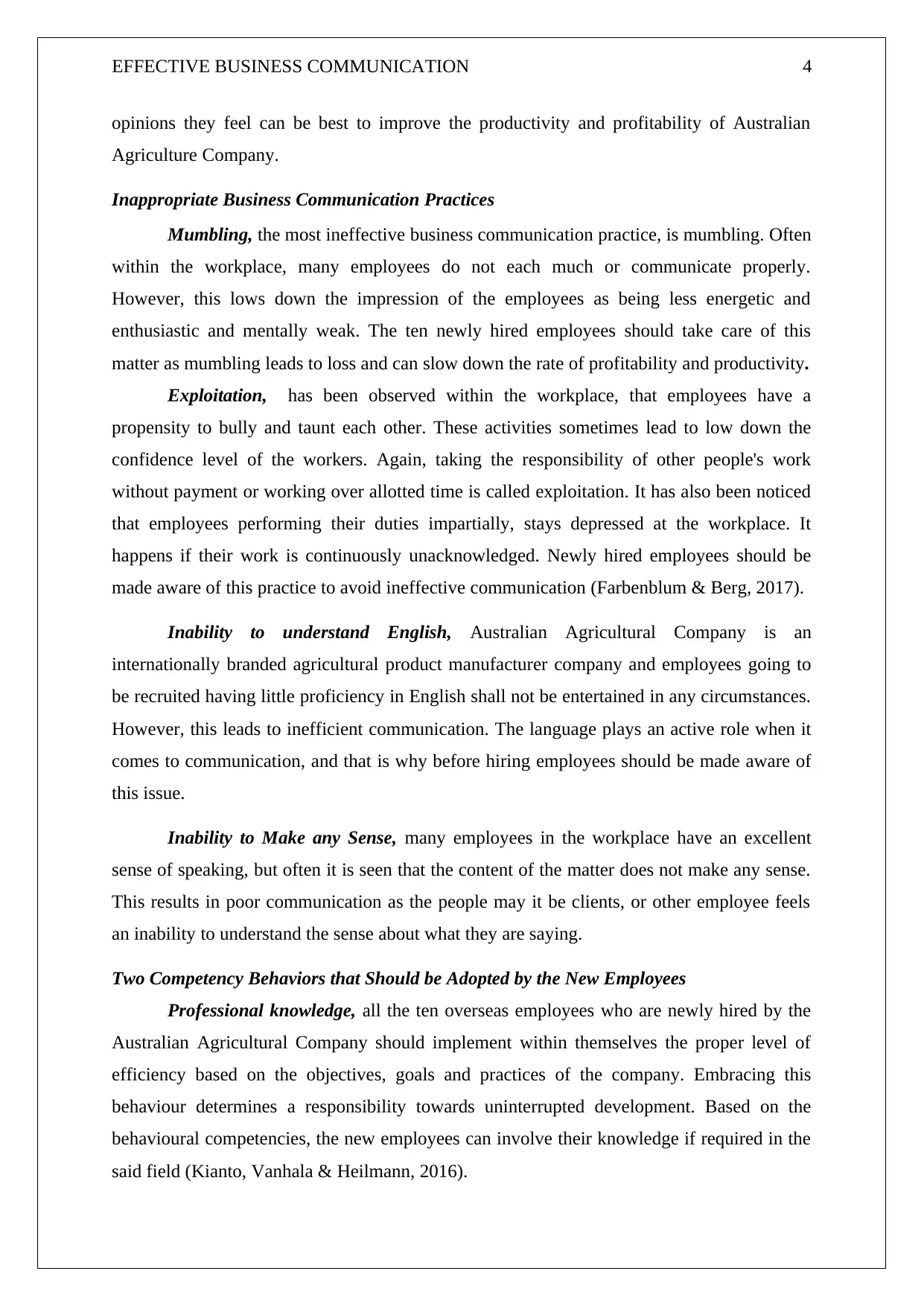
EFFECTIVE BUSINESS COMMUNICATION 4
opinions they feel can be best to improve the productivity and profitability of Australian
Agriculture Company.
Inappropriate Business Communication Practices
Mumbling, the most ineffective business communication practice, is mumbling. Often
within the workplace, many employees do not each much or communicate properly.
However, this lows down the impression of the employees as being less energetic and
enthusiastic and mentally weak. The ten newly hired employees should take care of this
matter as mumbling leads to loss and can slow down the rate of profitability and productivity.
Exploitation, has been observed within the workplace, that employees have a
propensity to bully and taunt each other. These activities sometimes lead to low down the
confidence level of the workers. Again, taking the responsibility of other people's work
without payment or working over allotted time is called exploitation. It has also been noticed
that employees performing their duties impartially, stays depressed at the workplace. It
happens if their work is continuously unacknowledged. Newly hired employees should be
made aware of this practice to avoid ineffective communication (Farbenblum & Berg, 2017).
Inability to understand English, Australian Agricultural Company is an
internationally branded agricultural product manufacturer company and employees going to
be recruited having little proficiency in English shall not be entertained in any circumstances.
However, this leads to inefficient communication. The language plays an active role when it
comes to communication, and that is why before hiring employees should be made aware of
this issue.
Inability to Make any Sense, many employees in the workplace have an excellent
sense of speaking, but often it is seen that the content of the matter does not make any sense.
This results in poor communication as the people may it be clients, or other employee feels
an inability to understand the sense about what they are saying.
Two Competency Behaviors that Should be Adopted by the New Employees
Professional knowledge, all the ten overseas employees who are newly hired by the
Australian Agricultural Company should implement within themselves the proper level of
efficiency based on the objectives, goals and practices of the company. Embracing this
behaviour determines a responsibility towards uninterrupted development. Based on the
behavioural competencies, the new employees can involve their knowledge if required in the
said field (Kianto, Vanhala & Heilmann, 2016).
opinions they feel can be best to improve the productivity and profitability of Australian
Agriculture Company.
Inappropriate Business Communication Practices
Mumbling, the most ineffective business communication practice, is mumbling. Often
within the workplace, many employees do not each much or communicate properly.
However, this lows down the impression of the employees as being less energetic and
enthusiastic and mentally weak. The ten newly hired employees should take care of this
matter as mumbling leads to loss and can slow down the rate of profitability and productivity.
Exploitation, has been observed within the workplace, that employees have a
propensity to bully and taunt each other. These activities sometimes lead to low down the
confidence level of the workers. Again, taking the responsibility of other people's work
without payment or working over allotted time is called exploitation. It has also been noticed
that employees performing their duties impartially, stays depressed at the workplace. It
happens if their work is continuously unacknowledged. Newly hired employees should be
made aware of this practice to avoid ineffective communication (Farbenblum & Berg, 2017).
Inability to understand English, Australian Agricultural Company is an
internationally branded agricultural product manufacturer company and employees going to
be recruited having little proficiency in English shall not be entertained in any circumstances.
However, this leads to inefficient communication. The language plays an active role when it
comes to communication, and that is why before hiring employees should be made aware of
this issue.
Inability to Make any Sense, many employees in the workplace have an excellent
sense of speaking, but often it is seen that the content of the matter does not make any sense.
This results in poor communication as the people may it be clients, or other employee feels
an inability to understand the sense about what they are saying.
Two Competency Behaviors that Should be Adopted by the New Employees
Professional knowledge, all the ten overseas employees who are newly hired by the
Australian Agricultural Company should implement within themselves the proper level of
efficiency based on the objectives, goals and practices of the company. Embracing this
behaviour determines a responsibility towards uninterrupted development. Based on the
behavioural competencies, the new employees can involve their knowledge if required in the
said field (Kianto, Vanhala & Heilmann, 2016).
Paraphrase This Document
Need a fresh take? Get an instant paraphrase of this document with our AI Paraphraser
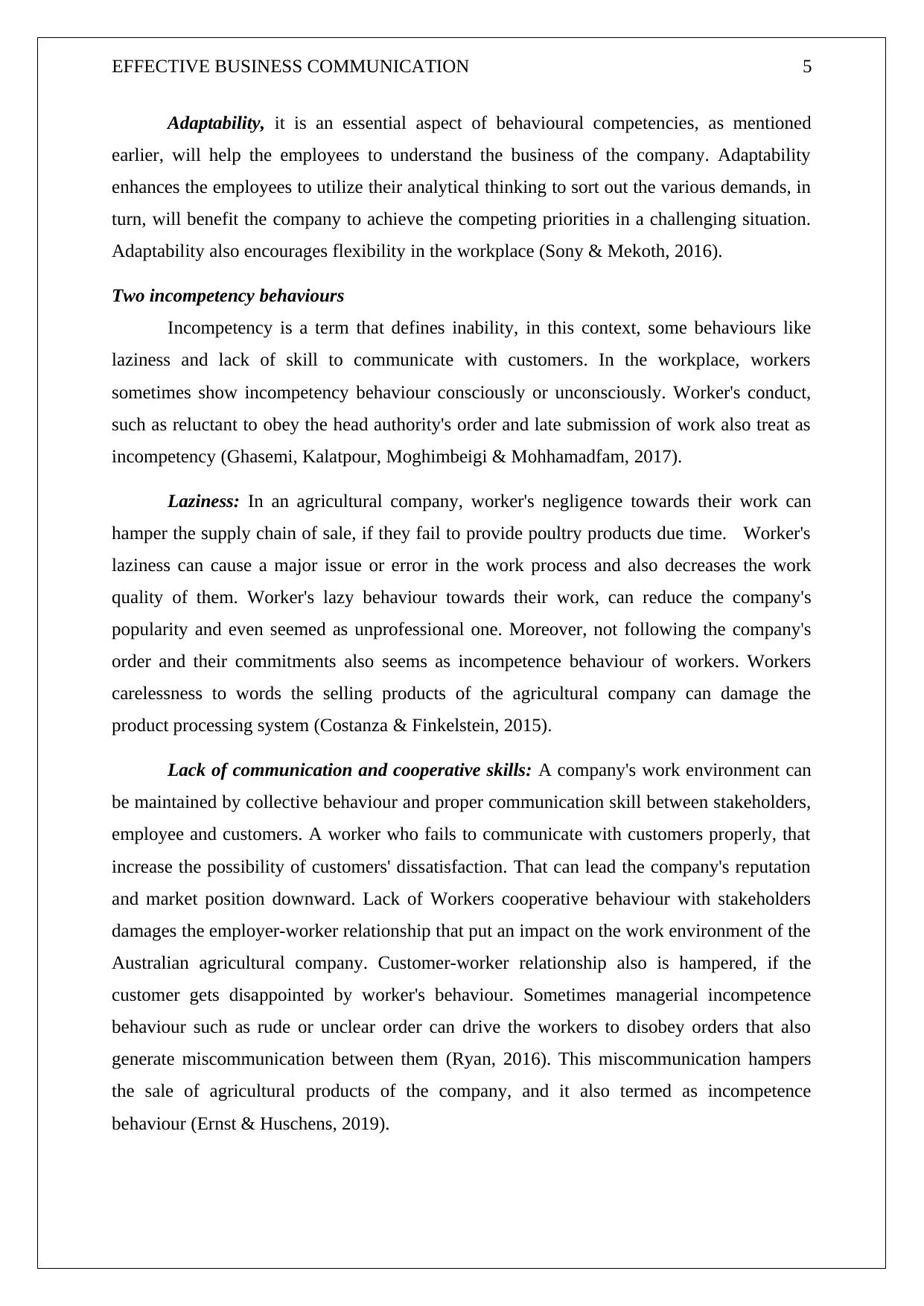
EFFECTIVE BUSINESS COMMUNICATION 5
Adaptability, it is an essential aspect of behavioural competencies, as mentioned
earlier, will help the employees to understand the business of the company. Adaptability
enhances the employees to utilize their analytical thinking to sort out the various demands, in
turn, will benefit the company to achieve the competing priorities in a challenging situation.
Adaptability also encourages flexibility in the workplace (Sony & Mekoth, 2016).
Two incompetency behaviours
Incompetency is a term that defines inability, in this context, some behaviours like
laziness and lack of skill to communicate with customers. In the workplace, workers
sometimes show incompetency behaviour consciously or unconsciously. Worker's conduct,
such as reluctant to obey the head authority's order and late submission of work also treat as
incompetency (Ghasemi, Kalatpour, Moghimbeigi & Mohhamadfam, 2017).
Laziness: In an agricultural company, worker's negligence towards their work can
hamper the supply chain of sale, if they fail to provide poultry products due time. Worker's
laziness can cause a major issue or error in the work process and also decreases the work
quality of them. Worker's lazy behaviour towards their work, can reduce the company's
popularity and even seemed as unprofessional one. Moreover, not following the company's
order and their commitments also seems as incompetence behaviour of workers. Workers
carelessness to words the selling products of the agricultural company can damage the
product processing system (Costanza & Finkelstein, 2015).
Lack of communication and cooperative skills: A company's work environment can
be maintained by collective behaviour and proper communication skill between stakeholders,
employee and customers. A worker who fails to communicate with customers properly, that
increase the possibility of customers' dissatisfaction. That can lead the company's reputation
and market position downward. Lack of Workers cooperative behaviour with stakeholders
damages the employer-worker relationship that put an impact on the work environment of the
Australian agricultural company. Customer-worker relationship also is hampered, if the
customer gets disappointed by worker's behaviour. Sometimes managerial incompetence
behaviour such as rude or unclear order can drive the workers to disobey orders that also
generate miscommunication between them (Ryan, 2016). This miscommunication hampers
the sale of agricultural products of the company, and it also termed as incompetence
behaviour (Ernst & Huschens, 2019).
Adaptability, it is an essential aspect of behavioural competencies, as mentioned
earlier, will help the employees to understand the business of the company. Adaptability
enhances the employees to utilize their analytical thinking to sort out the various demands, in
turn, will benefit the company to achieve the competing priorities in a challenging situation.
Adaptability also encourages flexibility in the workplace (Sony & Mekoth, 2016).
Two incompetency behaviours
Incompetency is a term that defines inability, in this context, some behaviours like
laziness and lack of skill to communicate with customers. In the workplace, workers
sometimes show incompetency behaviour consciously or unconsciously. Worker's conduct,
such as reluctant to obey the head authority's order and late submission of work also treat as
incompetency (Ghasemi, Kalatpour, Moghimbeigi & Mohhamadfam, 2017).
Laziness: In an agricultural company, worker's negligence towards their work can
hamper the supply chain of sale, if they fail to provide poultry products due time. Worker's
laziness can cause a major issue or error in the work process and also decreases the work
quality of them. Worker's lazy behaviour towards their work, can reduce the company's
popularity and even seemed as unprofessional one. Moreover, not following the company's
order and their commitments also seems as incompetence behaviour of workers. Workers
carelessness to words the selling products of the agricultural company can damage the
product processing system (Costanza & Finkelstein, 2015).
Lack of communication and cooperative skills: A company's work environment can
be maintained by collective behaviour and proper communication skill between stakeholders,
employee and customers. A worker who fails to communicate with customers properly, that
increase the possibility of customers' dissatisfaction. That can lead the company's reputation
and market position downward. Lack of Workers cooperative behaviour with stakeholders
damages the employer-worker relationship that put an impact on the work environment of the
Australian agricultural company. Customer-worker relationship also is hampered, if the
customer gets disappointed by worker's behaviour. Sometimes managerial incompetence
behaviour such as rude or unclear order can drive the workers to disobey orders that also
generate miscommunication between them (Ryan, 2016). This miscommunication hampers
the sale of agricultural products of the company, and it also termed as incompetence
behaviour (Ernst & Huschens, 2019).
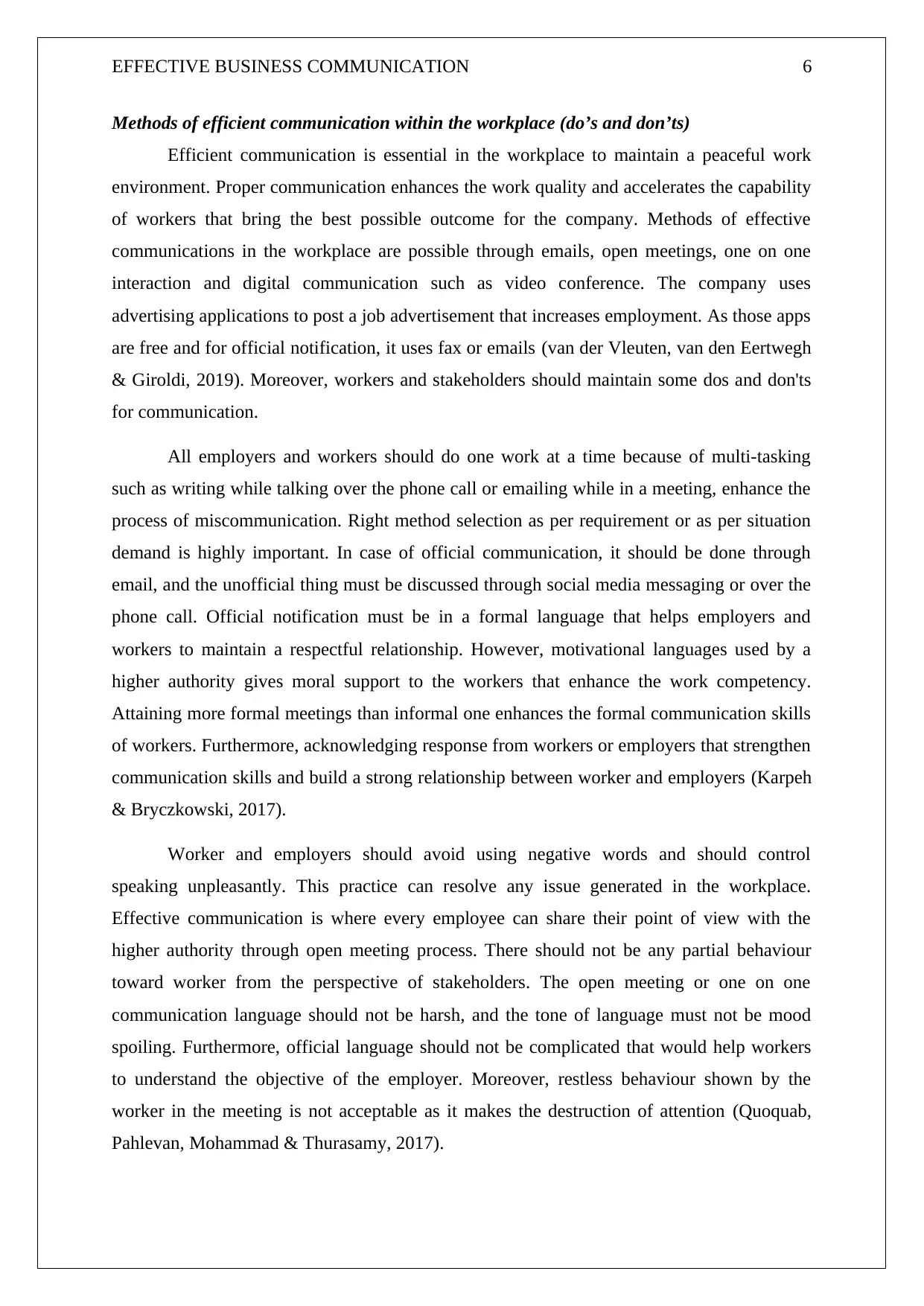
EFFECTIVE BUSINESS COMMUNICATION 6
Methods of efficient communication within the workplace (do’s and don’ts)
Efficient communication is essential in the workplace to maintain a peaceful work
environment. Proper communication enhances the work quality and accelerates the capability
of workers that bring the best possible outcome for the company. Methods of effective
communications in the workplace are possible through emails, open meetings, one on one
interaction and digital communication such as video conference. The company uses
advertising applications to post a job advertisement that increases employment. As those apps
are free and for official notification, it uses fax or emails (van der Vleuten, van den Eertwegh
& Giroldi, 2019). Moreover, workers and stakeholders should maintain some dos and don'ts
for communication.
All employers and workers should do one work at a time because of multi-tasking
such as writing while talking over the phone call or emailing while in a meeting, enhance the
process of miscommunication. Right method selection as per requirement or as per situation
demand is highly important. In case of official communication, it should be done through
email, and the unofficial thing must be discussed through social media messaging or over the
phone call. Official notification must be in a formal language that helps employers and
workers to maintain a respectful relationship. However, motivational languages used by a
higher authority gives moral support to the workers that enhance the work competency.
Attaining more formal meetings than informal one enhances the formal communication skills
of workers. Furthermore, acknowledging response from workers or employers that strengthen
communication skills and build a strong relationship between worker and employers (Karpeh
& Bryczkowski, 2017).
Worker and employers should avoid using negative words and should control
speaking unpleasantly. This practice can resolve any issue generated in the workplace.
Effective communication is where every employee can share their point of view with the
higher authority through open meeting process. There should not be any partial behaviour
toward worker from the perspective of stakeholders. The open meeting or one on one
communication language should not be harsh, and the tone of language must not be mood
spoiling. Furthermore, official language should not be complicated that would help workers
to understand the objective of the employer. Moreover, restless behaviour shown by the
worker in the meeting is not acceptable as it makes the destruction of attention (Quoquab,
Pahlevan, Mohammad & Thurasamy, 2017).
Methods of efficient communication within the workplace (do’s and don’ts)
Efficient communication is essential in the workplace to maintain a peaceful work
environment. Proper communication enhances the work quality and accelerates the capability
of workers that bring the best possible outcome for the company. Methods of effective
communications in the workplace are possible through emails, open meetings, one on one
interaction and digital communication such as video conference. The company uses
advertising applications to post a job advertisement that increases employment. As those apps
are free and for official notification, it uses fax or emails (van der Vleuten, van den Eertwegh
& Giroldi, 2019). Moreover, workers and stakeholders should maintain some dos and don'ts
for communication.
All employers and workers should do one work at a time because of multi-tasking
such as writing while talking over the phone call or emailing while in a meeting, enhance the
process of miscommunication. Right method selection as per requirement or as per situation
demand is highly important. In case of official communication, it should be done through
email, and the unofficial thing must be discussed through social media messaging or over the
phone call. Official notification must be in a formal language that helps employers and
workers to maintain a respectful relationship. However, motivational languages used by a
higher authority gives moral support to the workers that enhance the work competency.
Attaining more formal meetings than informal one enhances the formal communication skills
of workers. Furthermore, acknowledging response from workers or employers that strengthen
communication skills and build a strong relationship between worker and employers (Karpeh
& Bryczkowski, 2017).
Worker and employers should avoid using negative words and should control
speaking unpleasantly. This practice can resolve any issue generated in the workplace.
Effective communication is where every employee can share their point of view with the
higher authority through open meeting process. There should not be any partial behaviour
toward worker from the perspective of stakeholders. The open meeting or one on one
communication language should not be harsh, and the tone of language must not be mood
spoiling. Furthermore, official language should not be complicated that would help workers
to understand the objective of the employer. Moreover, restless behaviour shown by the
worker in the meeting is not acceptable as it makes the destruction of attention (Quoquab,
Pahlevan, Mohammad & Thurasamy, 2017).
⊘ This is a preview!⊘
Do you want full access?
Subscribe today to unlock all pages.

Trusted by 1+ million students worldwide
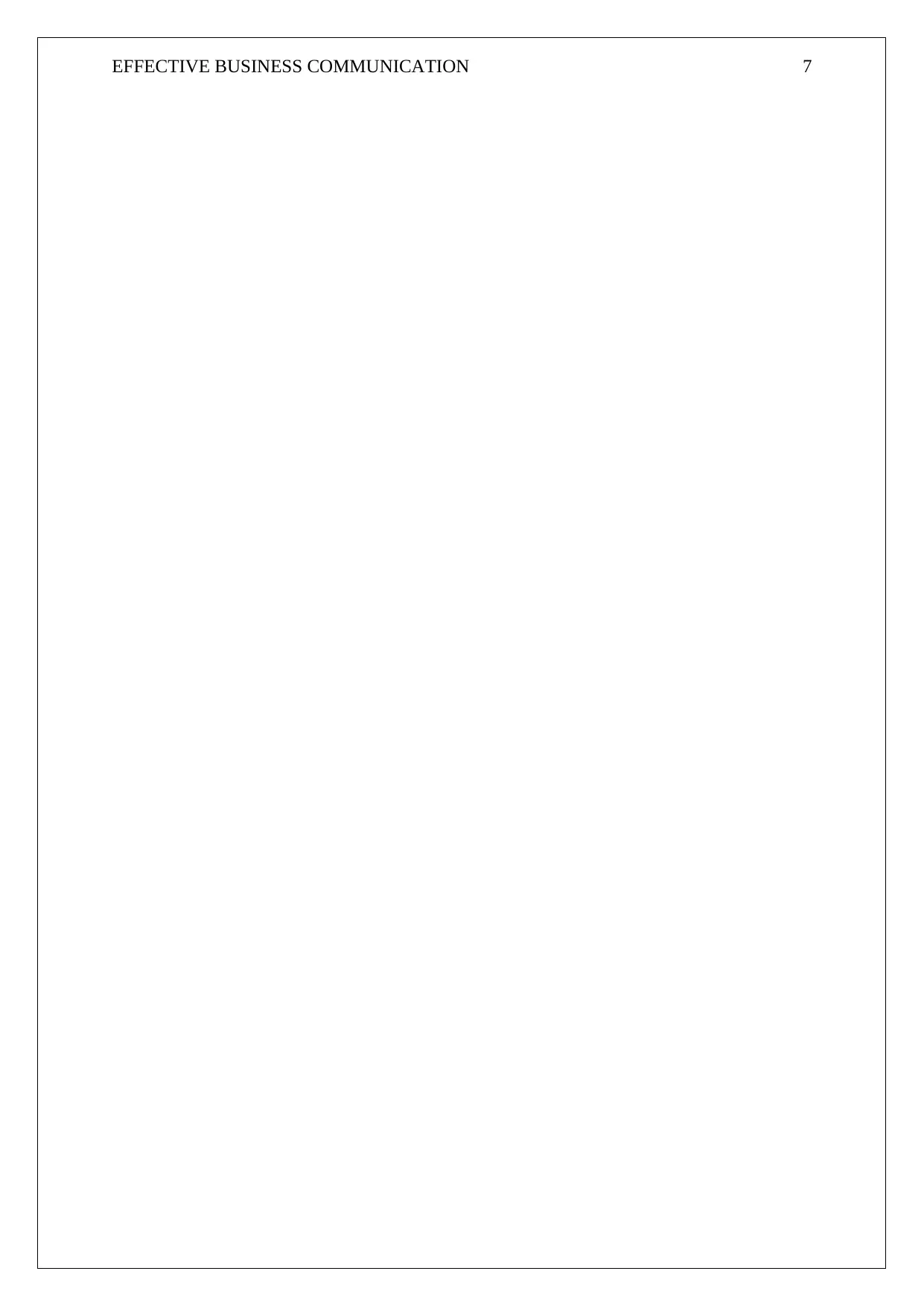
EFFECTIVE BUSINESS COMMUNICATION 7
Paraphrase This Document
Need a fresh take? Get an instant paraphrase of this document with our AI Paraphraser
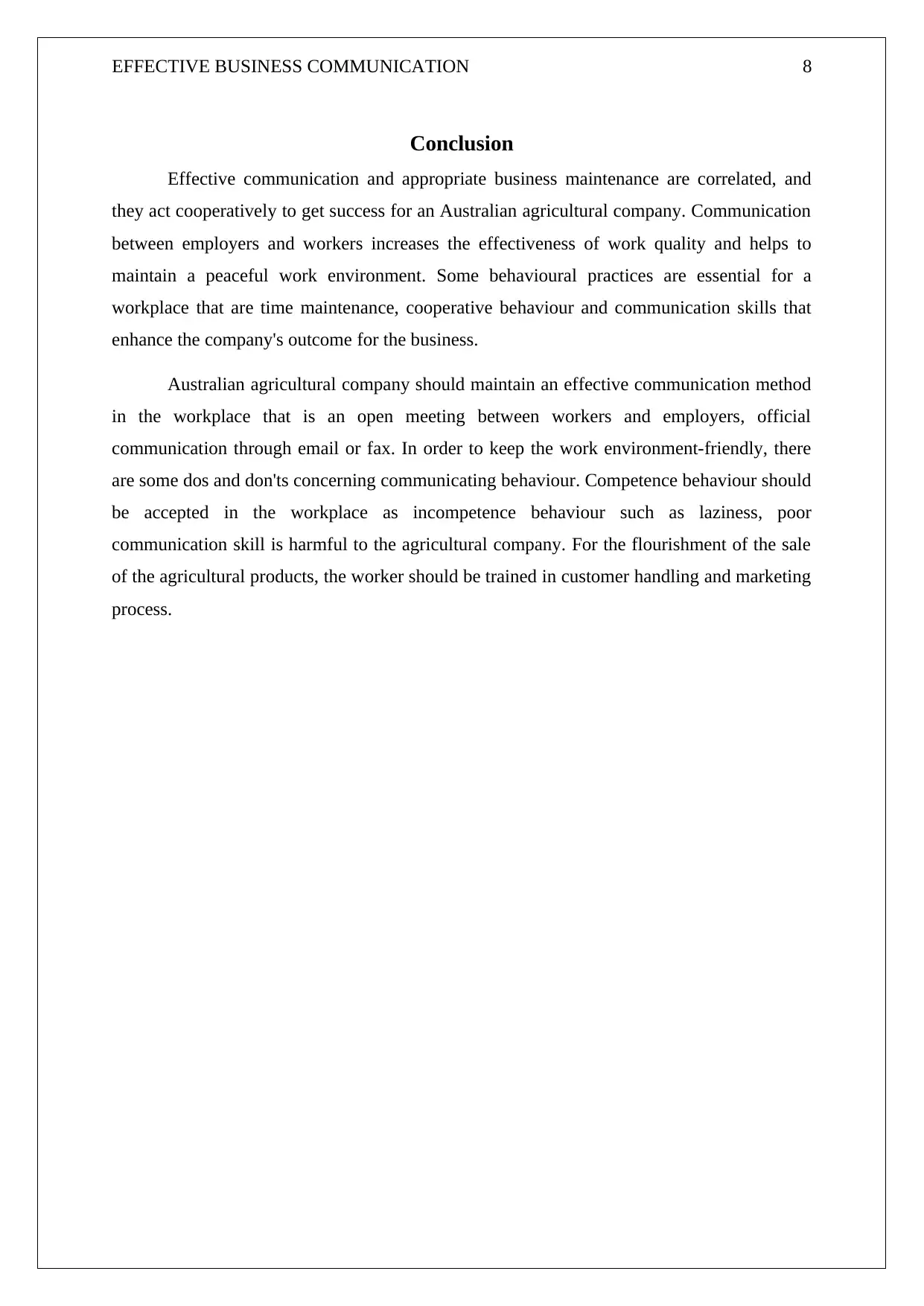
EFFECTIVE BUSINESS COMMUNICATION 8
Conclusion
Effective communication and appropriate business maintenance are correlated, and
they act cooperatively to get success for an Australian agricultural company. Communication
between employers and workers increases the effectiveness of work quality and helps to
maintain a peaceful work environment. Some behavioural practices are essential for a
workplace that are time maintenance, cooperative behaviour and communication skills that
enhance the company's outcome for the business.
Australian agricultural company should maintain an effective communication method
in the workplace that is an open meeting between workers and employers, official
communication through email or fax. In order to keep the work environment-friendly, there
are some dos and don'ts concerning communicating behaviour. Competence behaviour should
be accepted in the workplace as incompetence behaviour such as laziness, poor
communication skill is harmful to the agricultural company. For the flourishment of the sale
of the agricultural products, the worker should be trained in customer handling and marketing
process.
Conclusion
Effective communication and appropriate business maintenance are correlated, and
they act cooperatively to get success for an Australian agricultural company. Communication
between employers and workers increases the effectiveness of work quality and helps to
maintain a peaceful work environment. Some behavioural practices are essential for a
workplace that are time maintenance, cooperative behaviour and communication skills that
enhance the company's outcome for the business.
Australian agricultural company should maintain an effective communication method
in the workplace that is an open meeting between workers and employers, official
communication through email or fax. In order to keep the work environment-friendly, there
are some dos and don'ts concerning communicating behaviour. Competence behaviour should
be accepted in the workplace as incompetence behaviour such as laziness, poor
communication skill is harmful to the agricultural company. For the flourishment of the sale
of the agricultural products, the worker should be trained in customer handling and marketing
process.

EFFECTIVE BUSINESS COMMUNICATION 9
References
Costanza, D., & Finkelstein, L. (2015). Generationally Based Differences in the Workplace:
Is There a There There?. Industrial And Organizational Psychology, 8(3), 308-323. doi:
10.1017/iop.2015.15
Ernst, C., & Huschens, M. (2019). Friendly, Humorous, Incompetent? On the Influence of
Emoticons on Interpersonal Perception in the Workplace. Proceedings Of The 52Nd
Hawaii International Conference On System Sciences. doi: 10.24251/hicss.2019.095
Farbenblum, B., & Berg, L. (2017). Migrant workers’ access to remedy for exploitation in
Australia: the role of the national Fair Work Ombudsman. Australian Journal Of Human
Rights, 23(3), 310-331. doi: 10.1080/1323238x.2017.1392478
Ghasemi, F., Kalatpour, O., Moghimbeigi, A., & Mohhamadfam, I. (2017). A path analysis
model for explaining unsafe behaviour in workplaces: the effect of perceived work
pressure. International Journal Of Occupational Safety And Ergonomics, 24(2), 303-
310. doi: 10.1080/10803548.2017.1313494
Hargie, O. (2016). Skilled Interpersonal Communication. doi: 10.4324/9781315741901
Karpeh, M., & Bryczkowski, S. (2017). Digital communications and social media use in
surgery: how to maximize communication in the digital age. Innovative Surgical
Sciences, 2(3), 153-157. doi: 10.1515/iss-2017-0019
Kianto, A., Vanhala, M., & Heilmann, P. (2016). The impact of knowledge management on
job satisfaction. Journal Of Knowledge Management, 20(4), 621-636. doi: 10.1108/jkm-
10-2015-0398
MacDonald, P., Kelly, S., & Christen, S. (2014). A Path Model of Workplace Solidarity,
Satisfaction, Burnout, and Motivation. International Journal Of Business
Communication, 56(1), 31-49. doi: 10.1177/2329488414525467
Martin, J., & Nakayama, T. (2015). Reconsidering intercultural (communication) competence
in the workplace: a dialectical approach. Language And Intercultural
Communication, 15(1), 13-28. doi: 10.1080/14708477.2014.985303
References
Costanza, D., & Finkelstein, L. (2015). Generationally Based Differences in the Workplace:
Is There a There There?. Industrial And Organizational Psychology, 8(3), 308-323. doi:
10.1017/iop.2015.15
Ernst, C., & Huschens, M. (2019). Friendly, Humorous, Incompetent? On the Influence of
Emoticons on Interpersonal Perception in the Workplace. Proceedings Of The 52Nd
Hawaii International Conference On System Sciences. doi: 10.24251/hicss.2019.095
Farbenblum, B., & Berg, L. (2017). Migrant workers’ access to remedy for exploitation in
Australia: the role of the national Fair Work Ombudsman. Australian Journal Of Human
Rights, 23(3), 310-331. doi: 10.1080/1323238x.2017.1392478
Ghasemi, F., Kalatpour, O., Moghimbeigi, A., & Mohhamadfam, I. (2017). A path analysis
model for explaining unsafe behaviour in workplaces: the effect of perceived work
pressure. International Journal Of Occupational Safety And Ergonomics, 24(2), 303-
310. doi: 10.1080/10803548.2017.1313494
Hargie, O. (2016). Skilled Interpersonal Communication. doi: 10.4324/9781315741901
Karpeh, M., & Bryczkowski, S. (2017). Digital communications and social media use in
surgery: how to maximize communication in the digital age. Innovative Surgical
Sciences, 2(3), 153-157. doi: 10.1515/iss-2017-0019
Kianto, A., Vanhala, M., & Heilmann, P. (2016). The impact of knowledge management on
job satisfaction. Journal Of Knowledge Management, 20(4), 621-636. doi: 10.1108/jkm-
10-2015-0398
MacDonald, P., Kelly, S., & Christen, S. (2014). A Path Model of Workplace Solidarity,
Satisfaction, Burnout, and Motivation. International Journal Of Business
Communication, 56(1), 31-49. doi: 10.1177/2329488414525467
Martin, J., & Nakayama, T. (2015). Reconsidering intercultural (communication) competence
in the workplace: a dialectical approach. Language And Intercultural
Communication, 15(1), 13-28. doi: 10.1080/14708477.2014.985303
⊘ This is a preview!⊘
Do you want full access?
Subscribe today to unlock all pages.

Trusted by 1+ million students worldwide

EFFECTIVE BUSINESS COMMUNICATION 10
Quoquab, F., Pahlevan, S., Mohammad, J., & Thurasamy, R. (2017). Factors affecting
consumers’ intention to purchase counterfeit product. Asia Pacific Journal Of Marketing
And Logistics, 29(4), 837-853. doi: 10.1108/apjml-09-2016-0169
Sony, M., & Mekoth, N. (2016). The relationship between emotional intelligence, frontline
employee adaptability, job satisfaction and job performance. Journal Of Retailing And
Consumer Services, 30, 20-32. doi: 10.1016/j.jretconser.2015.12.003
The Palgrave Handbook of Workers’ Participation at Plant Level. (2019). doi: 10.1057/978-
1-137-48192-4
Quoquab, F., Pahlevan, S., Mohammad, J., & Thurasamy, R. (2017). Factors affecting
consumers’ intention to purchase counterfeit product. Asia Pacific Journal Of Marketing
And Logistics, 29(4), 837-853. doi: 10.1108/apjml-09-2016-0169
Sony, M., & Mekoth, N. (2016). The relationship between emotional intelligence, frontline
employee adaptability, job satisfaction and job performance. Journal Of Retailing And
Consumer Services, 30, 20-32. doi: 10.1016/j.jretconser.2015.12.003
The Palgrave Handbook of Workers’ Participation at Plant Level. (2019). doi: 10.1057/978-
1-137-48192-4
1 out of 10
Related Documents
Your All-in-One AI-Powered Toolkit for Academic Success.
+13062052269
info@desklib.com
Available 24*7 on WhatsApp / Email
![[object Object]](/_next/static/media/star-bottom.7253800d.svg)
Unlock your academic potential
Copyright © 2020–2025 A2Z Services. All Rights Reserved. Developed and managed by ZUCOL.





